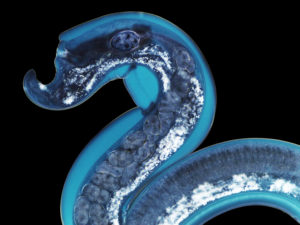Despite eradication attempts, up to 2 billion people in developing countries have chronic helminth infections. These helminths have developed ways to hide from the immune system by down-regulating the immune response towards them. The industrialised countries have virtually eradicated helminth infections and this has been suggested to have led to an increase in allergic diseases in the developed world.
Studies have found that helminths can decrease the symptoms of various autoimmune conditions and therefore the interest in helminths in therapy has increased over the years. Currently, 15 clinical trials are using helminths to treat certain conditions.
The absence of gut microbiota has also been linked to certain allergic diseases. Mouse studies have found that mice lacking gut microbiota are more likely to develop allergic diseases. Therefore, researchers from the Global Health Institute, Switzerland, investigated how intestinal helminths modulate allergic disease and if this involved changes in the gut microbiota.
The researchers found that gut bacteria aided the intestinal helminths to control allergy in mice infected with the helminth Heligmosomoides polygyrus bakeri . In the absence of the gut microbiota, the mice were more likely to get allergic disease even after being infected with the helminth. The helminths exerted this immune-modulation by stimulating the gut bacteria to produce short-chain fatty acids. If the mice were engineered to lack fatty acid receptors the effect was lost.
These findings show that helminths are able to attenuate allergic disease through stimulating bacteria to produce anti-inflammatory metabolites such as these short-chain fatty acids. This study provides a perfect example of how helminths and bacteria may have evolved together to regulate the human immune system. These adaptations may not only be applicable in allergic diseases but may also affect other inflammatory conditions.
Journal article: Zaiss et al.,2015. The Intestinal Microbiota Contributes to the Ability of Helminths to Modulate Allergic Inflammation. Immunity
Article by Thandeka Moyo














